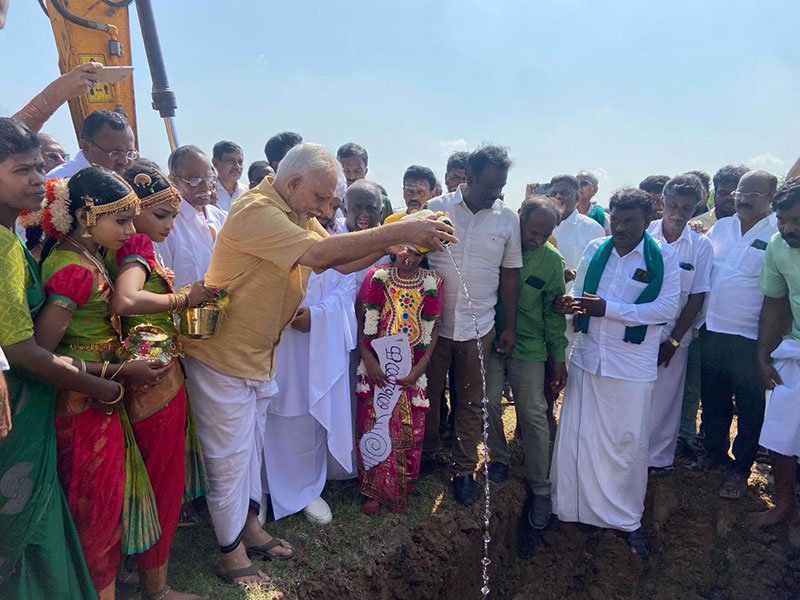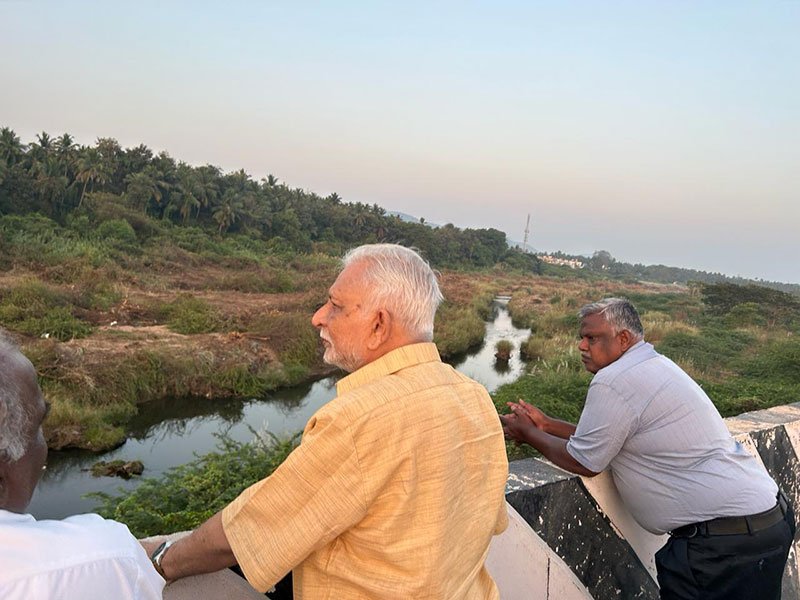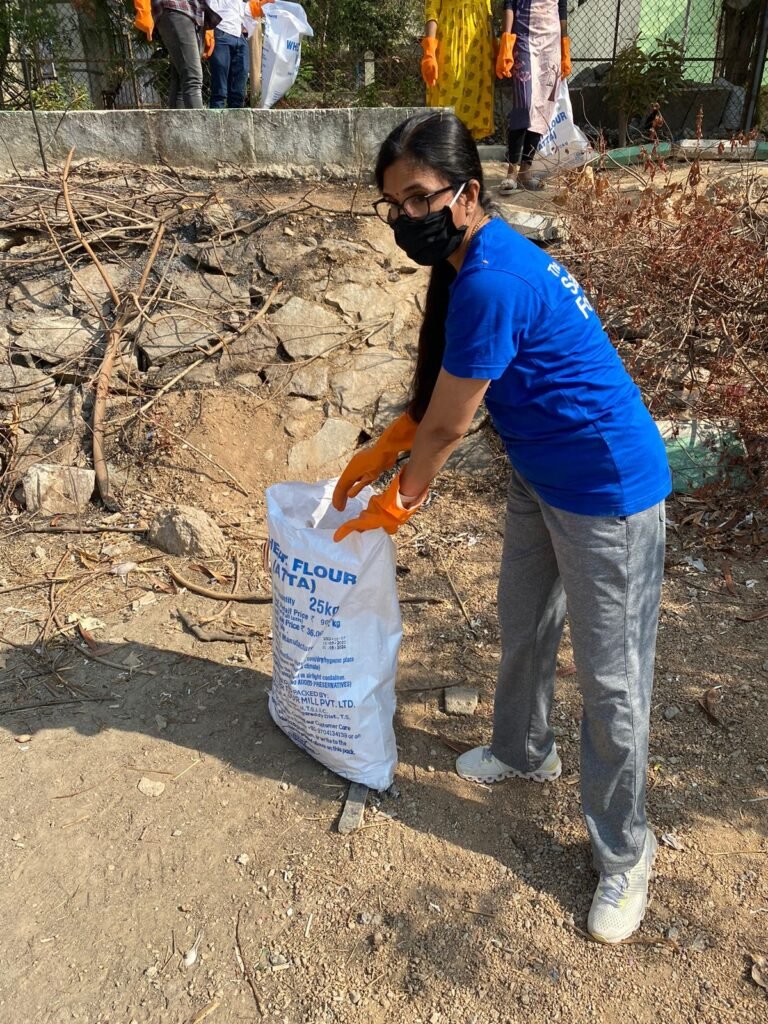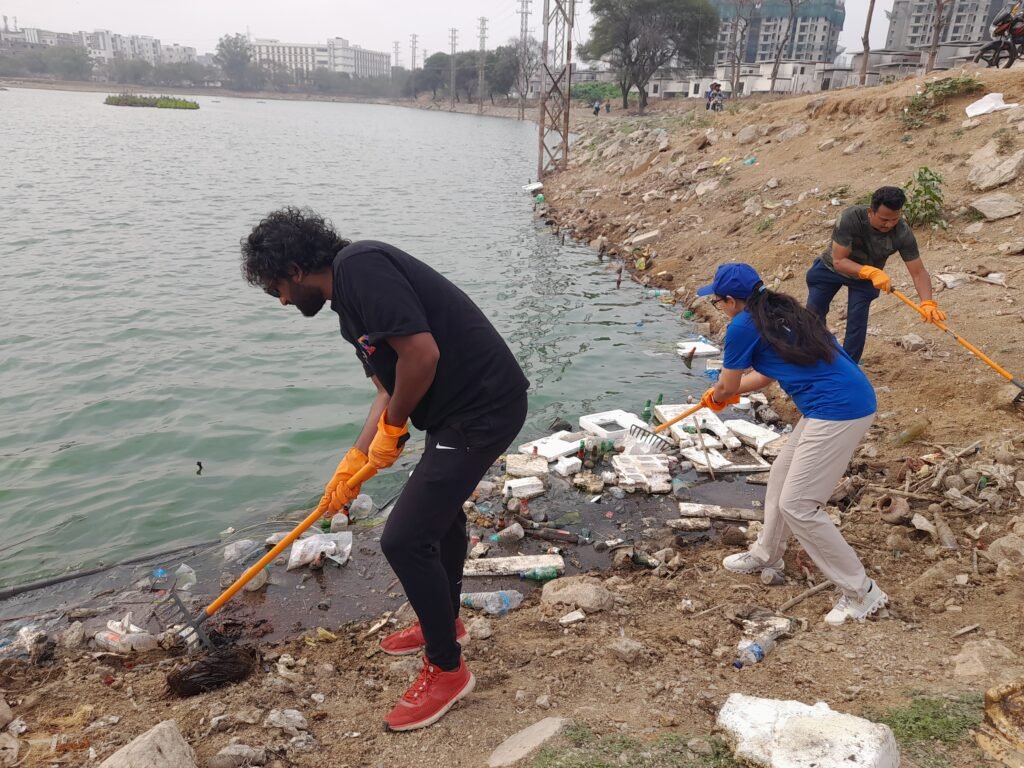The Satsang Foundation is engaged in various social and environmental causes. Through its Satsang Jal Seva Sangatan initiative, the Foundation has championed the management and rejuvenation of various water bodies across the country. In 2023, as part of the Steering Committee of the Civil20 (C20) track of the G20, Sri M inspired the creation of a Working Group focussed on “Revival of Rivers and Water Management”, which brought together hundreds of concerned organisations and individuals from across the globe who are working in the area of water security.
The run-up to World Water Day saw a variety of activities being undertaken under The Satsang Foundation’s initiatives to protect and nurture this precious life-giving element.
If you are inspired by this work, and would like to get involved in or support The Satsang Foundation’s initiatives related specifically to water or more broadly in the area of environmental impact, please write to us at connect@satsang-foundation.org.
Madurai (Tamil Nadu): Sri M launches Vaigai Rejuvenation Project on WWD
On March 22nd, 2024 World Water Day, the people of Madurai, including service organisations, educational institutions, students and environmental activists came together at Puttu Thoppu to initiate a well-planned multi-year programme for rejuvenating the Vaigai river under the leadership of Sri M.
Vaigai, the crown jewel of Madurai replete with historical, cultural and social significance, today stagnates, polluted by both industrial effluents and residential Sevage. Adding to this, rampant encroachments by both humans and untamed alien species of plants choke the river, blocking its natural flow.
Hundreds of volunteers from 15 different civic groups along with excavators and other Earthmoving machinery will engage in this mammoth task to revive the river. The three vectors of this project will be:
- Creating awareness
- Clearly delineating the river’s path based on historical and government records
- Stopping pollution through treatment

Inaugurating the project, Sri M said the rivers and streams on this earth are analogous to the arteries of our body carrying blood. We need to keep these rivers healthy and clean in order to have a beautiful and sustainable earth to live in, he said. He expressed confidence that the task of rejuvenating the Vaigai will be successful given the enthusiasm and one-pointed sincere effort of all those assembled and concerned with the health of the river.
Vaigai basin is the most endangered among all 17 River Basins of Tamil Nadu. The river flows a distance of 289 km. Ayacut – Riparian right holdings are 75622ha. There are 1411 system water bodies and 362 non system water bodies with water holding capacity of 507.78ha across 20 Taluks and 27 blocks in five Districts. The flood plains, wetlands and community owned lands on both sides of the river are occupied and encroached upon.
Key facts
| Parameter | Upstream | Downstream | Comments |
| TDS | 180 mg/L | 1107 mg/L | The Water is Non Potable Downstream |
| COD | 20 mg/L | 404 mg/L | |
| Taste & Odour | Agreeable | Not Agreeable |

Project Launch
The day started at 6am with a journey upstream the Vaigai River to Thiruvedagam. Enroute various interactions and pitstops were made to understand the progression of the river and the impact of both natural and man-made encroachments and degradation in the river bed. At Thiruvedagam, Sri M and a small team prayed at the Thiru Eddaganathar temple and then visited the Vivekananda College run by Sri Ramakrishna Tapovan.
After joining the morning prayers, Sri M addressed the 1000+ college students on the occasion of World Water Day. His message was to uphold Indian cultural values of which rivers and water bodies are an integral part, using water judiciously a primary duty and safeguarding water bodies for future generations an absolute must.
From Thiruvedagam, the Satsang Foundation Jalsevaks headed to Madurai, with a pitstop at Thenur (the starting point of the Vaigai Restoration Works planned) enroute. Sri M interacted with the local civic leaders, anchoring the local river restoration activities there.

At Puttu Thopu in Madurai on the Vaigai river bed, Satsang Foundation Jalsevaks joined all the other local civic organisations to launch the Vaigai Rejuvenation Project. Water from five main rivers of Tamil Nadu was brought in and blessed by Sri M. The excavation and clearance work was commenced with the water sprinkled on the soil to symbolise the blessings of all the rivers for the project’s success.
Subsequently, the principal researcher on this project presented a detailed study report on the current issues, the goals and the action plan for rejuvenating the river. The first phase would include clearly marking the boundaries of the river across its entire stretch, followed by various phases of activity tailored to address the specific problems of the individual sections of the river.

Karauli (Rajasthan): Water & Peace People’s Summit
Blue is a well-accepted colour of peace and also commonly represents water. As the United Nations declared 2024 to be the “Year of Water and Peace,” a Water & Peace People’s Summit was held in Karauli (Rajasthan, India), inspired by Dr. Rajendra Singh, who heads Tarun Bharat Sangh (TBS). TBS has been working to improve year-round water availability in areas across India. In honour of his work spanning over four decades, Dr. Rajendra Singh is also called Jal-Purush (Water Man) and has received numerous awards and global recognition. He is also an inspiration for the Aviral Godavari Mission, in which The Satsang Foundation is a leading partner with the Namami Goda Foundation.
The venue of the conference fittingly was Shri Mahavir Ji, Banwaripur (District Karauli, Rajasthan), the holy land of Jain Tirthankar Mahavir, who preached the message of ahimsa (non-violence) over 2,500 years ago.

Approximately 200 participants, including individuals and organizations serving the cause of water not only in India but also in Europe and the Americas, attended the Summit. They were shown how blue (water) has brought green (vegetation and prosperity) to the harsh desert topography. The work done across multiple locations with complete community involvement to dramatically improve water availability in the arid desert state of Rajasthan is powerfully demonstrated by the numerous oases created and the revival of rivers that had run dry.
The revival of water has brought prosperity to communities through agriculture and animal husbandry. This has also enabled the return of community members who had either migrated to distant locations for work or were involved in serious crimes. Many dacoits of the notorious Chambal region who gave up violence, looting, and guns to take up the task of conserving water in this area were honoured during the Summit.

Delegates, in turn, presented the work they were doing across India to battle the water crisis, revive water bodies, and rejuvenate rivers. The Aviral Godavari team had the opportunity to share the work being done to rejuvenate the Godavari and its ecosystem and received much appreciation and promises of support from several participants. (For more information and to support the Mission, please visit: https://aviralgodavari.org)
Nashik (Maharashtra): Kunds Cleaned, Restored at Godavari’s Origin
The primary objective of the Aviral Godavari Mission is the rejuvenation of the Godavari, the second-longest river in India. The Satsang Foundation, Namami Goda Foundation, and partner organizations have come together to work for this cause. Restoration of existing water bodies, which could be natural or man-made ponds, lakes, or wells, is one of the activities being undertaken immediately. Cleaning of the ponds, also known as kunds, will ensure water exchange through the ground with neighbouring water bodies, thereby replenishing the Godavari. Dr. Ajit Gokhale, founder of Natural Solutions, a scientific and technical consultancy firm for Nature Conservation and Sustainable Development, has been supporting the mission with his technical expertise.
There was excitement and anticipation in the air as work began on the Vaanar kund. Locals living near the Brahmagiri ranges were actively engaged in the work, which is now set to be an ongoing source of income for them. The cleaning of Vaanar kund was completed the following week, enabling a holding capacity of 700 litres of water.

Work on the kund near the Hanuman Temple was started in late January 2024. Briefly interrupted by a local festival, the work was completed around the 3rd week of February. The Hanuman kund is expected to fill up during the monsoons, with a capacity of around 10,000 litres.
Three contiguous kunds, Brahma-Vishnu-Mahesh kunds, were not easy to work on as the openings to the kunds were rather small. The Brahma kund, with a holding capacity of 5,000 liters, was started in early March and completed in less than a week. The Mahesh and Vishnu kunds were next to be cleaned. Water was transferred between the kunds, to avoid wastage, or incurring additional expenditure for storage tubs. The Mahesh kund was cleaned in time for Shivaratri. After Shivaratri, the Vishnu kund was similarly cleaned at Brahmagiri. Mahesh and Vishnu kunds both have a capacity of 3,680 litres each. In the energy of the successes, the workers also cleaned a small neighbouring kund.

Loose boulder pitching has been done for the Hanuman kund. The stones recovered from the kunds has been placed upstream of the kunds in such a way that they form an appropriate diversion wall to prevent direct entry of the runoff water coming with mud, into the kunds.
Mud and water from the kunds being repaired has not been wasted as the cleaning work progressed kund after kund. While locals are able to use that water for their cattle, the mud has been collected on gradual slopes and will be used for tree plantation on the mountain itself.
Awareness creation among tourists through signage stressing the importance of keeping the kunds clean and highlighting the efforts and expenses invested in bringing them to their pristine state is also planned. To protect the kunds, other arrangements will be made for pilgrims to immerse their religious offerings, and kunds will be covered with lids to prevent any garbage from getting into them, aiding in future maintenance of the cleaned and greened hills.
Work has also been undertaken to desilt two wells in the neighbourhood.

Within a short span of 4 months, there has been commendable progress in the work of enabling recharge of the aquifers as well as visible and underground streams to the Godavari.
Kanakapura (Karnataka): Rainwater Harvesting to Green Kanakapura Forest
Given the dire water shortages that India’s Silicon Valley, Bengaluru, is facing, the Satsang Jal Seva Sangatan (SJSS) and MyTree initiative together launched a rainwater harvesting and tree planting project in the forest of Kanakapura Taluk, 55 kms South of the city on World Water Day.
Kanakapura taluk is located in Ramanagara district of Karnataka, on the banks of the Arkavathy river. There are rich forests in its vicinity coming under the purview of the Forest Department of Kanakapura. TSF has come forward to help with greening the location and helping to conserve rainwater over an area of 4,500 sq ft.
The Satsang Foundation has initiated the digging of three percolation wells in the department grounds and will plant 1500 saplings over the same area, in a dense plantation format.


Lathira (Uttar Pradesh): CSVL Children Clean up Ganga Ghat, Take Jal Seva Pledge
On World Water Day, children from the Chanda Satsang Vidyalaya, Lathira cleaned up the banks of the sacred river Ganga that embraces the school. Plastic waste was collected in dustbins and disposed of at a proper waste collection centre.

The children walked through village Lathira with a banner spreading awareness of the importance of water. They also took the Jal Seva Pledge to conserve water on the banks of the Ganga. The younger children were sensitised about the water crisis and asked to make drawings based on the theme.

Meerut (Uttar Pradesh): Jal Seva Pledge, Bal Panchayat for World Water Day
Volunteers from TSF Delhi-NCR visited the Kanyaa Uccha Praathmik Vidyalaya in Village Siwaya of Meerut district in Uttar Pradesh to address 100 children from Classes 4 to 8 on the importance of conserving water in the lead up to World Water Day.
A “Save Water” flash card was prepared with the children even as they recited the poem “Baarish” (Rain) and took the pledge to be a Jal Sevak.

This was followed by a Bal Panchayat in the neighbouring A to Z Colony on World Water Day where volunteers spoke to the children about daily water conservation practices and administered the Jal Seva pledge. The TSF Bal Panchayat or Children’s Club is geared to take up environmental activities in the vicinity, engaging the children with art, craft, story-telling and other interesting ways to work towards conserving the planet.

Mumbai (Maharashtra): Jal Seva Pledge by 2,800 Plus Students and School Staff
On World Water Day, the Jal Seva pledge was administered in Marathi to more than 2,800 students via the virtual classroom centre in Dadar in the presence of representatives of UNICEF and the Brihanmumbai Municipal Corporation. Students & Educators from about 70 municipal schools across Mumbai attended the pledge taking ceremony.

Hyderabad (Telangana): Lake-Cleaning, Youth Sensitisation on World Water Day
TSF volunteers participated in two cleaning drives in partnership with Dhruvansh, an e-NGO at Barla Kunta Lake and Lake Mushki to revive the two water bodies. Barla Kunta Lake in Gachibowli was clogged with garbage and Sewage seeping into it and many students and young people joined the initiative despite the difficulty of accessing some of the areas.

Lake Mushki has been transformed from a dry bed to a vibrant freshwater haven amidst the urban landscape but finds itself littered with glass bottles, thermocol packaging, wooden debris and plastic bags. The volunteers filled 15 large bags, readying them to be handed over to municipal authorities for safe disposal and recycling.

TSF also joined hands with the National Service Scheme (NSS) to organize an interactive session on water conservation for 70 undergraduates at Babu Jagjivan Ram (BJR) Government Degree College.
Science, liberal arts, and commerce students exchanged and proposed thought-provoking solutions towards effective water usage with the Satsang Jal Seva Sangathan (SJSS) team and their professors and Vice Principals.

The Water for Peace theme struck a chord with the students as they were reminded of the ongoing regional and international conflicts over water sharing. A short video of the SJSS cleaning drive at Lake Mushki served as a harbinger of hope to the young environmental stewards as they understood the impact of human activity on water bodies and explored options to save them with active participation from the local community.
The lively interaction touched upon:
- safe and effective water conservation practices at home
- efficient collection of water from public taps, pumps, and water tankers
- rainwater harvesting and recharging of groundwater
Concerns about the impact of neglect in water conservation and its repercussions in terms of agrarian and economic crises were expressed by the students.
The young Jal Sevaks then stood together to take the Water Pledge, promising to use water mindfully, protect this precious resource and inspire others.
Are you inspired to get involved personally or through your organisation, or to support the initiatives through a donation?
Email us on connect@satsang-foundation.org The next big day on the Environment calendar is Earth Day on April 22 – this year’s theme is “Planet vs Plastic”. Several activities are being executed in the run up to the Earth Day. You can start preparing for it with this half-hour podcast on Youtube that we did with the Earth Day Network
